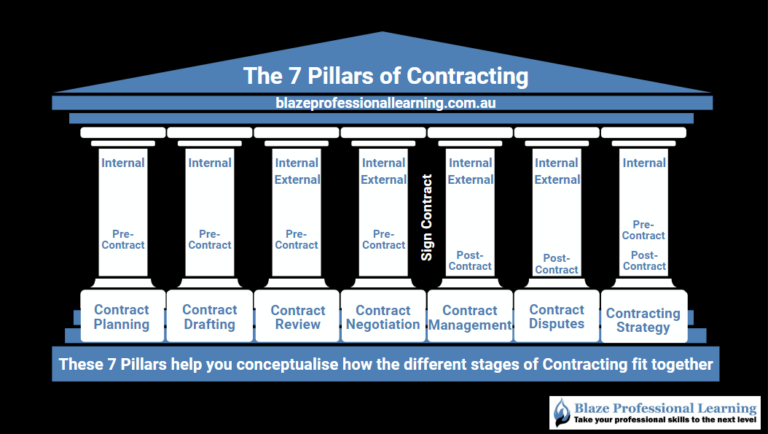The 7 Pillars of Contracting
What are The 7 Pillars of Contracting?

What is the purpose of The 7 Pillars of Contracting?
Thousands of Contracts Professionals work in roles where they deal with Contracts on a daily basis, but they often do not have a Law Degree. Having the right skills and knowledge to navigate the complexities of Contracting is essential for success of those Contracts Professionals and their organisation.
Despite the importance of Contracts, until now there hasn’t been a structured way for Contracts Professionals to conceptualise the work they do when dealing with Contracts.
Rachelle Hare at Blaze Professional Learning recognised this need. She created The 7 Pillars of Contracting to provide a comprehensive framework around Contracting for both Contracts Lawyers and Contracts Professionals.
This post will explore The 7 Pillars of Contracting and how you can use them to elevate your skills, minimise risks, and ensure success in your Professional career.
Contract Planning
The first Pillar of Contracting is Contract Planning. This phase involves defining clear objectives and creating a roadmap for your Contracts. A well-planned Contract is crucial for avoiding misunderstandings and ensuring all parties are on the same page.
To excel in Contract Planning, consider:
Identifying the key stakeholders and their roles
Determining the Project Delivery Method and appropriate form of Contract
Establishing the scope of the Contract, including deliverables and timelines
Working with your Lawyer to plan to draft the Contract
Assessing potential risks and developing mitigation strategies
If you are a Contracts Professional who does (or should do) Contract Planning, keep in mind the importance of clearly defined objectives and a comprehensive roadmap for your Contracts.
Contract Drafting
The second Pillar,
Contract Drafting, is where the terms and conditions of the agreement are
formalised. An effective Contract should minimise the risk of disputes and
clearly outline the responsibilities of all parties. To draft a successful
Contract:
Use clear and
concise language, avoiding ambiguity
Address all key
issues, such as payment terms, termination clauses, and dispute resolution
mechanisms
Include relevant
industry-specific clauses and standard provisions
Seek expert advice
or utilise templates when necessary
If you are a
Contracts Professional who does (or should do) Contract Drafting, you should
take into account the need for clarity and comprehensiveness in outlining the
terms and conditions of the agreement.
Contract Review
The third Pillar,
Contract Review, involves a thorough examination of the drafted Contract to
identify potential issues before they escalate. This process helps save time
and resources and ensures that the Contract aligns with the parties’
expectations. When reviewing a Contract:
Check for
inconsistencies and omissions
Ensure compliance
with applicable laws and regulations
Confirm that the
Contract’s terms align with your organisation’s objectives and risk tolerance
Consider engaging an
expert or using automated Contract review tools
If you are a
Contracts Professional who does (or should do) Contract Review, you should keep
in mind the importance of thoroughly examining the Contract for potential
issues and ensuring alignment with all parties’ expectations.
Contract
Negotiation
Contract
Negotiation, the fourth Pillar, is the process of reaching a mutually
beneficial agreement with the other party. Mastering negotiation techniques can
lead to more favourable outcomes for your organisation. To become a skilled
negotiator:
Understand the interests
and priorities of all parties
Develop a
negotiation strategy that considers various scenarios
Utilise effective
negotiation tactics, such as anchoring and framing
Strive for a
win-win outcome that strengthens long-term relationships
If you are a Contracts
Professional who does (or should do) Contract Negotiation, you should keep in
mind the importance of understanding the interests of all parties and utilising
effective negotiation tactics to reach mutually beneficial agreements.
Contract Management
The fifth Pillar,
Contract Management, focuses on maintaining a positive relationship with the
counterparty and ensuring the performance of the contracted party from start to
finish. Effective Contract Management practices include:
Regularly
monitoring performance against agreed-upon indicators
Communicating
openly and proactively addressing any concerns
Implementing a
system to manage Contract milestones, payments, and renewals
Collaborating with
the
Continue writing
please
counterparty to
identify opportunities for continuous improvement
If you are a
Contracts Professional who does (or should do) Contract Management, you should
take into account the need for open communication and proactive management of
the contracted party’s performance.
Contract Disputes
Contract Disputes,
the sixth Pillar, entails navigating conflicts and disagreements that may arise
during the Contract’s lifecycle. Having a clear process for managing disputes
can reduce their occurrence and severity. To effectively handle Contract Disputes:
Establish a dispute
resolution clause within the Contract
Identify the root
causes of disputes and seek to address them early on
Utilise
negotiation, mediation, arbitration, or litigation as appropriate
Learn from disputes
to improve future Contracts and relationships
If you are a
Contracts Professional who does (or should do) Contract Disputes, you should
keep in mind the importance of having a clear process for managing disputes and
learning from them to improve future Contracts.
Contracting
Strategy
The seventh and
final Pillar, Contracting Strategy, involves making informed decisions that
align with your organisation’s goals, resources, and market conditions. A
well-developed Contracting Strategy can lead to more successful outcomes and a
competitive advantage for your organisation. To create an effective Contracting
Strategy:
Assess your
organisation’s strengths, weaknesses, opportunities, and threats (SWOT
analysis)
Align Contracting
objectives with overall business goals and objectives
Evaluate market
trends and consider how they may impact your organisation’s Contracting
approach
Develop a risk
management plan that addresses potential challenges and uncertainties
If you are a
Contracts Professional who does (or should do) Contracting Strategy, you should
take into account the need for a comprehensive approach that aligns with your
organisation’s goals, resources, and market conditions.
Conclusion:
The 7 Pillars of Contracting, developed by Rachelle Hare at Blaze Professional Learning, provides a comprehensive framework for both Lawyers and Contracts Professionals to excel in their roles. By understanding and applying these principles, you can elevate your skills, minimise risks, and ensure success in your professional career. Embrace the 7 Pillars of Contracting, and unlock your potential to become a true expert in the world of Contracts.
Imagine knowing the ins and outs of:
- Contract Planning – Lay the foundation for success by defining clear objectives and creating a roadmap for your contracts.
- Contract Drafting – Draft contracts with confidence, minimising the risk of disputes and ensuring all parties are on the same page.
- Contract Review – Save time and resources by quickly identifying potential issues before they escalate.
- Contract Negotiation – Learn the best techniques to negotiating a contract with the other party. Become a pro at securing mutually beneficial agreements, using effective negotiation strategies and techniques.
- Contract Management – Maintain a positive relationship with your organisation’s counterparty with ease, using best practices to manage the performance of the contracted party from start to finish.
- Contract Disputes – Stay calm in the face of conflict, using a clear process to reduce the occurrence and severity of contractual disputes and resolve disputes efficiently and effectively.
- Contracting Strategy – Make informed decisions, using a comprehensive approach that aligns with your organisation’s goals, resources, and market conditions.
By understanding The 7 Pillars of Contracting, learning its fundamentals and applying them in your daily role, you can elevate your skills, minimise risks, and ensure success in your Professional career, however you deal with contracts.
So why wait?
Start exploring the 7 Pillars of Contracting now, and take your Contracting expertise to the next level.

